BOURSE SECURITIES LIMITED
6th April, 2020
Equity Markets Trade Lower- Q1 2020
This week, we at Bourse review the performance of the local and international equity markets for the first quarter (Q1) of 2020. The rapid global progression of the novel coronavirus (COVID-19) across the world has had an adverse impact on economic activity, dampening investor sentiment across all major financial markets. Domestically, all three major indices on the Trinidad and Tobago Stock Market continue to face headwinds. Internationally, equity markets have corrected sharply, characterised by persistent volatility despite sustained attempts made by governments and central banks to mitigate shocks to economies.
Local Market Review
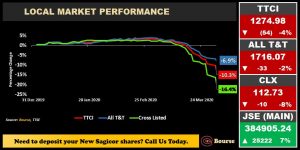
The Trinidad and Tobago Composite Index (TTCI) shed 10.3% of its value as at the end of Q1 2020 relative to its value at the close of 2019, more than erasing its advance from the previous year. The Cross Listed Index (CLX), with a heavy 44.9% weighting in NCBFG (i33.2% YTD), fell 16.4% at the close of Q1 2020. The All T&T (All T&T) Index which is based on the performance of companies solely listed on the domestic market, was relatively resilient declining 6.9%, as compared to regionally listed stocks.
Major Movers
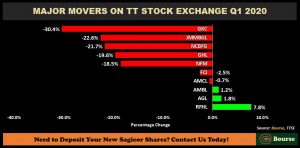
COVID-19 is having an unprecedented effect on the global economy, halting production and trade, disrupting supply chains, creating shocks to commodity prices and in many cases creating a ban on people’s ability to travel. These conditions are now becoming more prevalent within the Caribbean region as the number of COVID-19 cases continues to grow, forcing countries to close non-essential businesses and even issue curfews.
The impact to the real economy has led to a flight from riskier assets by investors, in anticipation of lower corporate earnings. At the end of the Q1 2020, only 3 stocks listed on the Trinidad and Tobago stock exchange advanced, namely Republic Financial Holdings Limited (RFHL +7.8%), Agostini’s Limited (AGL +1.8%) and Ansa Merchant Bank Limited (+1.2%). Rounding out the ‘top five’ performers on the market year to date would be Eastern Caribbean-based bank FirstCaribbean International (FCI -2.5%) and local conglomerate Ansa McAL (AMCL -0.7%) which, despite being in the red, still outperformed the broader market. Meanwhile the list of the top five decliners was led by three Jamaican-based entities; conglomerate GraceKennedy (GKC -30.4%), financial conglomerates JMMB Group Limited (JMMB -22.6%) and NCB Financial Group Limited (NCBFG -21.7%). Local companies Guardian Holdings Limited and National Flour Mills round out the list for biggest decliners, falling 19.6% and 18.5% at the end of the quarter.
On the Local Horizon
A number of domestic companies have been affected by COVID-19, while the government has undertaken increased expenditure to buffer the economy from the economic threats posed. It is increasingly likely that companies will take extraordinary measures to preserve the longer-term financial health of their respective businesses. As an example, Ansa McAl (AMCL) and its listed subsidiary Ansa Merchant Bank (AMBL) have taken the decision to not pay final dividends for FY2019 in attempt to mitigate the financial toll of the virus on the company.
The effect of COVID-19 is expected to be significant. Reduced consumer demand is highly likely, given (i) Loss of employment and /or reduced income, (ii) Closure of non-essential business and dissuasion of non-essential movement and (iii) lower consumer confidence which could lead to a lower propensity to spend.
On the supply side, companies could face higher costs of doing business through enhanced hygiene measures and supply chain disruptions.
International Markets Volatile
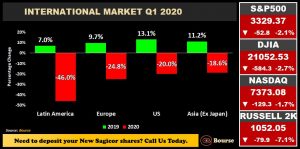
US Markets Stumble
Initially showcasing strong growth at the start of the year, US markets closed Q1 2020 down 20%. The country has now reported the largest number of COVID-19 cases globally. To mark the end of March, the US reported a record number of initial jobless claims with 6.6M workers filing for unemployment benefits. This is the natural result of an economy that has been practically halted, as a multitude of industries have come under pressure, including services industries, airlines, cruise lines, food, entertainment and a multitude of related sectors.
In attempts to counter the economic fallout of COVID-19, the US Federal Reserve reduced the benchmark rate to a range of 0.00% to 0.25% and engaged in record breaking security buyback programs. The US government, meanwhile, has embarked on an economic stimulus plan which has, thus far, involved three phases of stimulus packages, with the last package worth an estimated US$3T.
Asia (ex-Japan) Declines
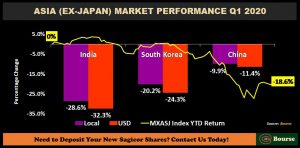
The first quarter of 2020 (Q1 2020) was tumultuous for Asian (ex-Japan) equity markets, as it declined 18.6% YTD. This was driven by a decrease of 11.4% YTD for Chinese equity markets, with China being the ‘birthplace’ of COVID-19. The Chinese economy is expected to shrink for the first time in at least 30 years, with economists forecasting a 9% YoY contraction in Q1 GDP. The country has issued loans amounting to approximately US$989B in the first quarter as a part of its recovery plan, as well as a cut in the benchmark lending rate to 4.05% and instructions for banks to offer cheaper loans and payment relief for those firms significantly impacted by the pandemic. China is expected to ramp up its policies throughout the second quarter of the year. Indian markets also ended Q1 2020 on a negative note, recording a loss of 32.3% YTD. During Q1 2020, the Indian government followed major economies around the world, imposing travel restrictions, cutting its key interest rate by 75 basis points to 4.4% (its lowest in a decade), implementing a US$22B economic stimulus package and allowing payment relief on loans.
European Markets Fall
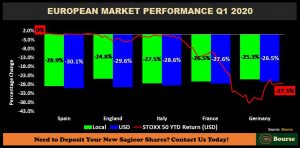
European equity markets, fell 27.5% in Q1 2020. This comes as the global coronavirus pandemic hit the continent at an alarming rate, with Italy and Spain trailing the US for the highest number of cases worldwide. Lockdowns and travel restrictions have been implemented throughout the region, resulting in the reduction of economic activity. Germany is now faced with a decline in exports to China and steep reduction in vehicle sales, with the German DAX Index down 26.5% YTD. Real GDP for the Eurozone and the UK is estimated to decline 1.5% and 0.7%, respectively in 2020, which could likely be understated. The Bank of England reduced key interest rates to 0.1%, launched quantitative easing measures and introduced fiscal stimulus packages to provide grants for small businesses, to reduce and defer different tax payments and to preserve jobs. Additionally, the European Central Bank (ECB) announced a €750B (US$810) Pandemic Emergency Purchase Programme (PEPP), loosened capital requirements, and lowered the interest rate whilst easing lending requirements for its targeted long term refinancing operations (TLTRO). The uncertainty that continues to prevail around COVID-19 can further adversely affect trade, travel, tourism, financial markets and sentiment in the region.
Latin American Markets Lower
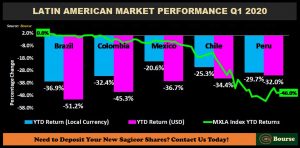
Latin American markets were not exempt from the effects of the COVID-19 virus, ending Q12020 with a 46% decline. Brazilian markets plummeted 51% during the quarter, with the country reporting 8,195 infected cases and 335 deaths. The Brazilian central bank reduced its benchmark rate by 50 basis points to a record low of 3.75% in an attempt to offset the negative impacts of the virus. However, the Central Bank may be forced to cut rates even further despite hesitation from officials as the economy continues to worsen. The market decline in Brazil, as in other countries, has been compounded by weakening of the Brazilian Real currency. Investor sentiment remains shaken, as President Bolsonaro continues to publicly downplay the COVID-19 pandemic.
In Mexico, the plunge in global oil prices and threat of COVID-19 has led to lower investor confidence. The Mexican stock market, as measured by the MEXBOL Index, declined 36.7% YTD. Mexico’s GDP was estimated to grow 0.7% prior to the current global pandemic but will certainly be revised.
Investor Considerations
With the full extent and duration of COVID-19 still very much uncertain, investors may want err on the side of caution. For the lower risk investors, moving to cash or near-cash holdings (such as income mutual funds, repurchase agreements etc.) may be the most prudent approach.
The current market convulsions, however, have created very attractive prices for local and international stocks (and bonds). There will undoubtedly be the urge to dive into the market headfirst. A more useful approach to bear in mind would be ‘averaging in’, investing in increments over time.
It cannot be said enough that COVID-19 is unlike most scenarios encountered by financial markets. Expect the unexpected.
For more information on these and other investment themes, please contact Bourse Securities Limited, at 226-8773 or email us at invest@boursefinancial.com.
“This document has been prepared by Bourse Securities Limited, (“Bourse”), for information purposes only. The production of this publication is not to in any way establish an offer or solicit for the subscription, purchase or sale of any of the securities stated herein to US persons or to contradict any laws of jurisdictions which would interpret our research to be an offer. Any trade in securities recommended herein is done subject to the fact that Bourse, its subsidiaries and/or affiliates have or may have specific or potential conflicts of interest in respect of the security or the issuer of the security, including those arising from (i) trading or dealing in certain securities and acting as an investment advisor; (ii) holding of securities of the issuer as beneficial owner; (iii) having benefitted, benefitting or to benefit from compensation arrangements; (iv) acting as underwriter in any distribution of securities of the issuer in the three years immediately preceding this document; or (v) having direct or indirect financial or other interest in the security or the issuer of the security. Investors are advised accordingly. Neither Bourse nor any of its subsidiaries, affiliates directors, officers, employees, representatives or agents, accepts any liability whatsoever for any direct, indirect or consequential losses arising from the use of this document or its contents or reliance on the information contained herein. Bourse does not guarantee the accuracy or completeness of the information in this document, which may have been obtained from or is based upon trade and statistical services or other third party sources. The information in this document is not intended to predict actual results and no assurances are given with respect thereto.”
